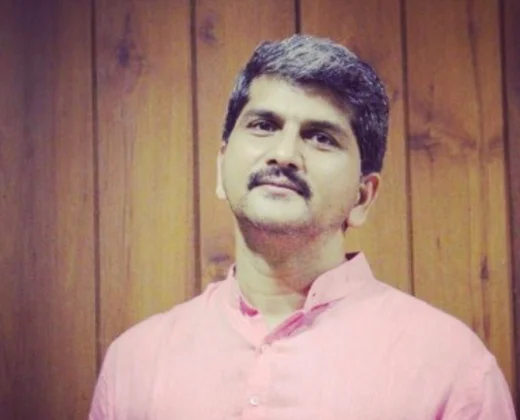Days to go...



In the contemporary landscape of Indian intellectual and social discourse, Gopal Goswami emerges as a compelling voice, a confluence of academic rigor, grassroots experience, unwavering national conviction, and a profound commitment to social upliftment. A Research Scholar at the esteemed Sardar Vallabhbhai National Institute of Technology (SVNIT), Surat, with a robust academic foundation comprising a Post Graduate degree in Public Administration and a Doctorate in Business Management, Goswami transcends the boundaries of conventional scholarship. He is not merely an observer of societal dynamics; he is an active participant, a chronicler of the nation's pulse through his incisive writings as a columnist for prominent national dailies and news portals, and a catalyst for intellectual exchange as the visionary behind the Surat Literature Festival.
This upcoming book, a meticulous examination of the Government of India's social welfare schemes and their multifaceted impact on the Indian populace, is born from a deep-seated understanding of the nation's socio-economic fabric, woven from threads of personal experience, academic inquiry, and an unwavering dedication to the vision of a resurgent and empowered Bharat by 2047. Goswami's perspective is uniquely informed by his deep-rooted connection to the land, his formative years spent in the remote Himalayan village of Bageshwar in Uttarakhand. Born to a resilient farmer mother and a disciplined army man father, the third among four siblings, his early education in government primary and inter-colleges, culminating in his graduation from a government degree college, instilled in him a profound appreciation for the challenges and aspirations of ordinary Indians.
This grounding in the realities of rural India provides a crucial lens through which Goswami analyzes the efficacy and reach of governmental initiatives. His experiences are not confined to the theoretical realms of academia; they are etched in the soil of his upbringing, resonating with the everyday struggles and triumphs of the vast majority of the Indian population. This inherent understanding of the socio-economic landscape, coupled with his academic training, positions him uniquely to offer a nuanced and insightful assessment of the impact of social welfare schemes.
The crucible of student activism further shaped Goswami's understanding of societal fault lines and the power of collective action. His time at Kumaon University's Almora campus during the tumultuous Mandal Commission agitation of 1993-94 witnessed his active and wholehearted participation, a testament to his early engagement with issues of social justice and equity, even though he belongs to Other Backward Classes (OBC) community and was the biggest beneficiary of Mondal Commission’s proposed reservation at the time. This active involvement, defying conventional expectations, underscores his commitment to principles of fairness and his willingness to engage with complex social issues head-on. His activism extended to the Uttarakhand Rajya Andolan during his college years, demonstrating a deep-seated regional consciousness and a commitment to the aspirations of his home state. These formative experiences in the realm of social and political movements have undoubtedly enriched his understanding of the intricate interplay between policy, implementation, and societal impact, providing a valuable backdrop for his analysis of social welfare schemes.
Beyond the realms of academia and activism, Goswami brings a wealth of practical experience garnered from over three decades in the construction industry. His pivotal role in numerous projects of national importance showcases his ability to translate vision into tangible reality, a skill that likely informs his assessment of the implementation challenges and successes of large-scale social programs. This extensive experience in a sector that directly impacts infrastructure development and employment generation provides him with a pragmatic understanding of the ground realities of development initiatives.
Currently serving as the Chairman of GAP Group, a real estate development firm actively involved in the ambitious Dholera Special Investment Region (SIR) in Gujarat, Goswami continues to contribute to the nation's growth trajectory. His leadership in this significant development project underscores his understanding of economic drivers and the complexities of large-scale planning and execution, providing another valuable dimension to his analysis of governmental schemes aimed at socio-economic transformation.
However, it is Goswami's deep-seated commitment to social work and his long-standing affiliation with the Rashtriya Swayamsevak Sangh (RSS) that have profoundly shaped his intellectual curiosity and his desire to delve into the intricacies of social problem-solving. This affiliation, often viewed through various lenses, has for Goswami served as a powerful impetus to understand and address the challenges faced by the most vulnerable sections of society. His involvement in social work is not merely a peripheral activity; it is an integral part of his ethos, driving his intellectual pursuit of effective solutions to societal issues.
The COVID-19 pandemic served as a stark reminder of the vulnerabilities faced by marginalized communities, and Goswami rose to the occasion with remarkable dedication. His tireless efforts in organizing the safe return of migrant workers from Gujarat & Maharashtra to Uttarakhand, their homes via trains and buses during this unprecedented crisis stand as a powerful testament to his empathy and his ability to mobilize resources for humanitarian causes. This direct engagement with the plight of migrant workers during a national emergency provided him with firsthand insights into the crucial role of social support systems and the challenges of ensuring equitable access to resources during times of crisis. This experience undoubtedly informs his analysis of the responsiveness and effectiveness of government interventions in addressing the needs of vulnerable populations.
Furthermore, Goswami's active engagement with youth engagement and leadership development programs in Surat and the surrounding region underscores his commitment to nurturing the next generation of leaders and fostering a sense of civic responsibility among young people. This involvement reflects his belief in the transformative power of education and empowerment in shaping a better future for the nation. His understanding of the aspirations and challenges faced by the youth likely provides a valuable perspective on the long-term impact of social welfare schemes on human capital development.
It is this rich tapestry of experiences – his upbringing in rural India, his academic pursuits, his activism, his entrepreneurial endeavours, his deep involvement in social work, and his unwavering nationalistic convictions – that has led Gopal Goswami to undertake a rigorous impact assessment of the Pradhan Mantri Awas Yojana (PMAY) in Surat city. This focused research embodies his commitment to translating his understanding of social problems into concrete analysis and potential solutions. His choice of PMAY as a subject of inquiry reflects his interest in addressing the fundamental need for housing and its impact on the lives and livelihoods of urban populations.
Therefore, this upcoming book on the Government of India's social welfare schemes is not merely an academic treatise; it is a culmination of a life lived in close proximity to the realities of India, a synthesis of intellectual rigor and grassroots understanding. Gopal Goswami's voice is one that resonates with authenticity, informed by a deep understanding of the challenges and opportunities that lie ahead for India as it strives towards its Amrit Kaal vision of Bharat@2047. His analysis will undoubtedly offer valuable insights for policymakers, academics, social workers, and every citizen invested in the nation's progress and the well-being of its people. This book promises to be a significant contribution to the discourse on social justice and inclusive development, offering a perspective rooted in the heartland of India and illuminated by the unwavering commitment of a scholar deeply invested in the nation's future. His unique vantage point, shaped by his diverse experiences and his profound understanding of the Indian ethos, promises to make this book an indispensable resource for comprehending the true impact of social welfare initiatives on the lives of millions.
